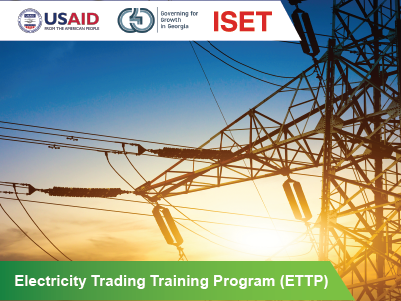Georgia committed to harmonize its electricity market legislation with EU Third Energy Package and liberalize it according to the accession protocol with the Energy Community. These structural changes are expected to contribute to a more efficient functioning of the Georgian electricity market and to support its development. The hope is that this will enhance the enabling environment for hydropower (and, more generally, renewable energy sources) development, in line with the strategy of Government of Georgia (GoG) for the further development of the energy sector. The Electricity Trading Mechanism (ETM) will also enable neighboring countries to transit electricity through Georgia to Turkey and beyond.
To support market development, it is foreseen to establish an organized spot electricity market, where market participants, namely electricity producers, traders, suppliers and electricity customers at wholesale level, will sell and procure electricity. The training program aimed exactly to provide participants with the basic tools, knowledge and skills necessary to define optimal selling and buying strategies and, more generally, to conduct electricity trading and risk-mitigating activities in the upcoming (ETM).
The aim of the ETTP training program was to increase the human and institutional capacity of the Georgian electricity market stakeholders, supporting the smooth transition to the new market model in Georgia. During the training, participants learned the key features of power markets and discussed the experiences of power sectors in emerging and developed electricity markets. The training included topics from electricity market economics, including the structure and the functioning of the demand and supply sides, network issues and specificities of the wholesale, retail level and cross-border trade, and tools and strategies available for trading and for risk-mitigation.
During the training, theoretical and practical activities were combined to help the participants understand the characteristics of competitive electricity markets, the purpose and characteristics of financial instruments, and how trading tools on electricity markets can be used to conduct profitable transactions and minimize risks and losses.
The training included 4 sessions:
• Introduction to electricity markets and economies foundations;
• Review of wholesale electricity market;
• Operations of wholesale electricity market;
• Strategies for risk management on the electricity market.
20 trainees were selected out of 26 applicants. At the end of the trainings, 11 trainees received a certificate of Successful Competition of the training and 5 trainees received Certificate of Attendance.
Topics
Electricity trading
Trainers
Norberto Pignatti
Levan Pavlenishvili
Mariam Chachava
Ivane Pirveli
Nikoloz Sumbadze
Zviad Gachechiladze
Irakli Galdava
Donors and Partners
USAID/Governing for Growth (G4G)











